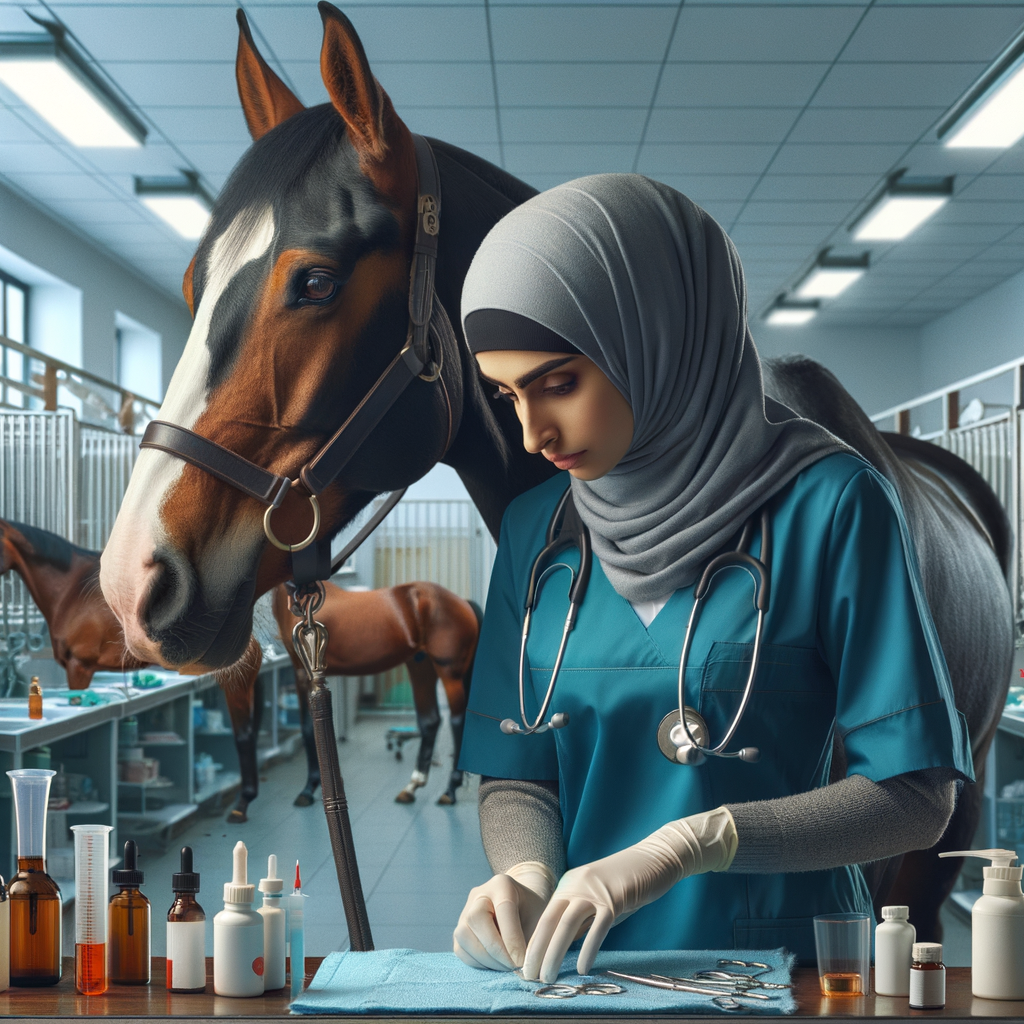
Introduction to Quarter Horse Health Care
Keeping a horse healthy and happy is a big responsibility. This is especially true for Quarter Horses, a breed known for its speed, agility, and strong muscular build. In this guide, we will delve into the specifics of Quarter Horse health care, helping you understand the importance of equine health and the specific considerations for this breed.
- Understanding the Importance of Equine Health
- Specific Health Considerations for Quarter Horses
Just like humans, horses need regular check-ups and a balanced diet to stay healthy. They also need plenty of exercise and mental stimulation. A healthy horse is more likely to perform well, whether in a race, on a trail, or in a show ring. Moreover, a well-cared-for horse lives longer and has a better quality of life.
While all horses need basic care, Quarter Horses have some specific health considerations. Due to their muscular build and athletic nature, they are prone to certain conditions like laminitis (a painful condition of the hooves) and tying-up syndrome (a muscle disorder). They also tend to gain weight easily, so their diet and exercise need to be carefully managed.
Here’s a table summarizing the key health considerations for Quarter Horses:
| Health Consideration | Description |
|---|---|
| Laminitis | A painful condition affecting the horse’s hooves, often caused by overeating on rich pasture or grain. |
| Tying-Up Syndrome | A muscle disorder that causes stiffness and pain, often triggered by strenuous exercise. |
| Weight Management | Quarter Horses tend to gain weight easily, so their diet and exercise need to be carefully managed to prevent obesity and related health problems. |
Understanding these health considerations is the first step towards providing the best care for your Quarter Horse. In the following sections, we will delve deeper into advanced equine care techniques, common Quarter Horse health issues, and advanced veterinary care for horses.
Advanced Equine Care Techniques
When it comes to the health and well-being of your Quarter Horse, advanced care techniques can make a significant difference. Let’s delve into some of the most effective preventive care methods.
Preventive Care
Preventive care is the first line of defense in maintaining your horse’s health. It involves a range of practices, from regular veterinary check-ups to dental care. Here are some key aspects:
- Regular Veterinary Check-ups
- Importance of Vaccinations and Deworming
- Dental Care for Horses
Regular veterinary check-ups are crucial for early detection of potential health issues. A typical check-up includes a physical examination, blood tests, and a thorough evaluation of the horse’s overall health. According to a study, horses that receive annual check-ups are less likely to develop severe health conditions.
Vaccinations are vital in protecting your horse from a variety of diseases, such as equine influenza and tetanus. Deworming, on the other hand, helps to keep your horse’s digestive system free from parasites. A regular schedule of vaccinations and deworming can significantly reduce the risk of illness.
Just like humans, horses also require regular dental care. This includes routine check-ups and teeth floating (smoothing of the teeth) to prevent oral discomfort and ensure proper nutrition intake. In fact, dental problems can lead to weight loss and other health issues if not addressed promptly.
Remember, preventive care is an investment in your horse’s health. By following these advanced care techniques, you can ensure your Quarter Horse lives a long, healthy, and happy life.
Specialized Nutrition
Every horse owner knows that good nutrition is the cornerstone of a healthy horse. But when it comes to Quarter Horses, their dietary needs can be a bit more specialized. Let’s delve into the specifics of their nutrition and the role of supplements in promoting optimal health.
- Understanding the dietary needs of Quarter Horses
- Supplements for optimal health
Quarter Horses are known for their muscular build and high energy levels. This makes their nutritional needs slightly different from other breeds. They require a balanced diet that includes protein, carbohydrates, fats, vitamins, and minerals. The amount of each nutrient depends on their age, size, and activity level.
For instance, a working Quarter Horse may need more calories compared to a horse that is not as active. Protein is essential for muscle development, while carbohydrates and fats provide the energy they need. Vitamins and minerals are crucial for various bodily functions, including bone health and immune system function.
It’s important to note that overfeeding can lead to obesity, which is a common health issue among Quarter Horses. Therefore, portion control and a balanced diet are key to their health.
Supplements can play a significant role in ensuring the optimal health of your Quarter Horse. They can fill in any nutritional gaps that may exist in their diet. However, it’s essential to consult with a veterinarian or an equine nutritionist before introducing any supplements.
Common supplements for Quarter Horses include joint supplements to support their active lifestyle, probiotics for digestive health, and vitamin and mineral supplements to ensure they’re getting all the necessary nutrients. Remember, supplements should not replace a balanced diet but should be used to enhance it.
| Nutrient | Role | Typical Requirement |
|---|---|---|
| Protein | Muscle development | 10-12% of diet |
| Carbohydrates and Fats | Energy source | Varies based on activity level |
| Vitamins and Minerals | Various bodily functions | Varies based on age and size |
In conclusion, understanding the specific dietary needs of your Quarter Horse and supplementing where necessary can go a long way in ensuring their optimal health and longevity. Always remember, a healthy horse is a happy horse!
Common Quarter Horse Health Issues
Quarter horses, like all breeds, can face certain health issues. Some of these are genetic, meaning they are passed down from parent to horse. Let’s take a closer look at these genetic disorders and how they can be managed.
Genetic Disorders
Genetic disorders are health problems that a horse is born with. These are caused by changes in the horse’s genes. They can affect the horse’s health and performance. But don’t worry, with proper care and management, horses with these disorders can still lead happy and healthy lives.
- Identifying and managing common genetic disorders
- Case study: Polysaccharide Storage Myopathy (PSSM)
Identifying genetic disorders in quarter horses can be challenging. It often requires a vet’s expertise and sometimes special tests. Some common genetic disorders in quarter horses include Hyperkalemic Periodic Paralysis (HYPP), Hereditary Equine Regional Dermal Asthenia (HERDA), and Polysaccharide Storage Myopathy (PSSM).
Managing these disorders involves a combination of diet, exercise, and sometimes medication. For example, a horse with PSSM would benefit from a diet low in sugars and starches and regular, light exercise.
Let’s take a closer look at PSSM, a common genetic disorder in quarter horses. PSSM causes a horse to store excessive amounts of sugar in its muscles. This can lead to muscle stiffness, weakness, and even collapse.
Consider the case of Star, a quarter horse diagnosed with PSSM. Star’s owner noticed that she was often stiff and reluctant to move. After a vet confirmed PSSM, Star’s diet was changed to include more fats and fewer sugars. She was also given regular, light exercise. With these changes, Star’s symptoms improved significantly.
Remember, early detection and proper management of genetic disorders can greatly improve a horse’s quality of life. Always consult with a vet if you suspect your horse may have a genetic disorder.
Injuries and Illnesses
-
Common Injuries in Quarter Horses
Quarter Horses, known for their agility and speed, are often prone to certain injuries. The most common injuries include:
- Strains and Sprains: These are injuries to the muscles and ligaments caused by overuse or sudden stress.
- Fractures: These occur when a bone breaks, often due to a fall or collision.
- Wounds: These can range from minor cuts to deep lacerations, often caused by accidents or fights with other horses.
It’s important to remember that early detection and treatment can prevent these injuries from becoming serious or chronic issues.
-
Recognizing Signs of Illness
Just like people, horses can get sick too. It’s crucial to recognize the signs of illness early to ensure your horse gets the care it needs. Here are some signs to look out for:
- Lack of Appetite: If your horse is eating less than usual, it could be a sign of illness.
- Changes in Behavior: Changes in your horse’s behavior, such as increased aggression or lethargy, can indicate sickness.
- Physical Changes: Look for changes in your horse’s body, such as weight loss, dull coat, or swollen joints.
Remember, if you notice any of these signs, it’s best to consult a vet immediately.
-
Emergency Care and When to Call a Vet
In some cases, your horse may need emergency care. Here are some situations when you should call a vet:
- Severe Injury: If your horse has a severe injury, such as a deep wound or broken bone, call a vet immediately.
- Sudden Illness: If your horse suddenly falls ill and shows signs like vomiting, diarrhea, or difficulty breathing, contact a vet right away.
- Unexplained Changes: If your horse shows unexplained changes in behavior or physical condition, it’s best to get a professional opinion.
Remember, it’s always better to be safe than sorry when it comes to your horse’s health. If you’re unsure, don’t hesitate to call a vet.
Advanced Veterinary Care for Horses
As we continue to explore the realm of horse health, it is crucial to understand the importance of advanced veterinary care. This includes a range of diagnostic techniques that are instrumental in maintaining the well-being of these magnificent creatures.
Diagnostic Techniques
Diagnostic techniques are the first step in identifying and addressing health issues in horses. With the help of modern technology, veterinarians can now diagnose conditions more accurately and quickly.
- Modern diagnostic tools in equine veterinary care
- Case study: Use of ultrasound in horse healthcare
There are numerous diagnostic tools available for equine veterinary care. These include digital radiography, endoscopy, and blood tests, among others. Digital radiography, for instance, provides high-resolution images of the horse’s body, allowing for a more precise diagnosis. Blood tests, on the other hand, can provide valuable insights into a horse’s overall health and detect potential issues such as infections or organ dysfunction.
Ultrasound is a non-invasive diagnostic tool that has proven to be highly effective in equine healthcare. It uses sound waves to create images of the horse’s internal structures, providing valuable information about the condition of its organs and tissues.
Consider the case of a racehorse named Starlight. Starlight was experiencing discomfort and reduced performance, but traditional diagnostic methods failed to identify the issue. However, when the veterinary team used an ultrasound, they discovered a small tear in Starlight’s tendon. This early detection allowed for prompt treatment, and Starlight was back to racing in no time. This case highlights the importance and effectiveness of ultrasound in equine healthcare.
Advanced veterinary care, particularly diagnostic techniques, plays a vital role in maintaining horse health. By utilizing modern tools and technologies, we can ensure our horses receive the best possible care and lead healthy, happy lives.
Treatment Methods
- Advancements in Equine Surgery
Equine surgery has seen significant advancements in recent years. From minimally invasive procedures to complex surgeries, the field has evolved to ensure better outcomes for horses. For instance, arthroscopy, a procedure that uses a tiny camera to view, diagnose, and treat problems inside a joint, has become a common practice in equine surgery.
- Role of Physiotherapy in Horse Health Management
Physiotherapy plays a crucial role in maintaining and improving horse health. It aids in the recovery of injuries, enhances performance, and prevents future health issues. Techniques such as massage, stretching, and hydrotherapy are commonly used in equine physiotherapy.
- Exercise and Training Tips for Quarter Horses
Proper exercise and training are vital for Quarter Horses. Regular exercise helps maintain a healthy weight, strengthens muscles, and improves cardiovascular health. Training should be varied and include both high-intensity workouts and low-stress activities. Remember, always warm up your horse before training and cool down afterward.
- Importance of Mental Health and Enrichment
Just like humans, horses also need mental stimulation for overall well-being. Enrichment activities such as puzzle feeders, toys, and social interaction can help keep your horse mentally active and reduce stress. Remember, a happy horse is a healthy horse.
- Key Takeaways for Maintaining Horse Health
Some key points to remember for maintaining horse health include regular veterinary check-ups, a balanced diet, proper exercise, and mental stimulation. Also, keep an eye out for any changes in your horse’s behavior or physical condition as these could be signs of health issues.
- Emerging Trends in Equine Health Care
Equine health care is continuously evolving with new trends and technologies. Some of the emerging trends include the use of stem cell therapy for treating injuries, digital thermography for early detection of health issues, and telemedicine for remote veterinary consultations.
- The Role of Technology in Advancing Horse Health
Technology plays a pivotal role in advancing horse health. From diagnostic tools such as ultrasound and MRI to treatment methods like laser therapy and robotic surgery, technology has revolutionized equine health care. It not only improves the accuracy of diagnosis but also enhances the effectiveness of treatments.






